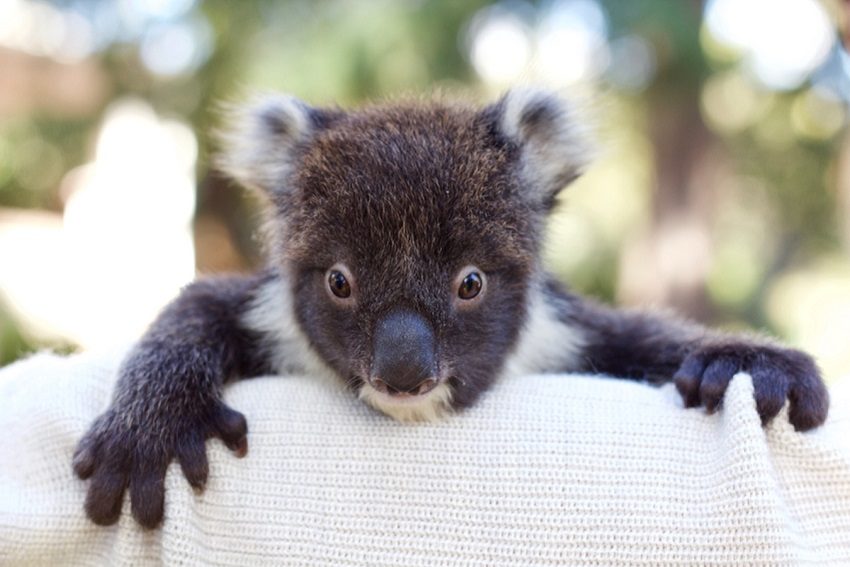Meet Adelaide’s Koala Rescue Squad

Driving home amid last week’s wild weather, as torrential rain turned to heavy hail, we spotted her. Forlorn and freezing, slumped motionless beside an Adelaide Hills roadside, it was clear something was very wrong with this koala.
She clambered about half a metre as we approached before collapsing in a torrent of water, apparently exhausted. With that, we scooped her up and brought her home to warm up before our fire, sure she would not survive out there on her own.
But what to do with a koala in our kitchen? A quick online search revealed a koala rescue hotline and within half an hour a kindly volunteer had arrived to collect our charge, whisking her off to the veterinary care she so obviously needed.
That 24-hour hotline — and two others catering for emergencies involving other types of native animals — only exists thanks to Fauna Rescue of South Australia, a non-profit organisation established by volunteers in 1988. “We take in right across the whole gamut of native wildlife,” chairwoman Liz MacGuinness, who lives at Munno Para, explains. “You name it, we get it.”

SA Fauna Rescue’s Merridy Montarello with a koala in her care
Last month alone, those hotlines fielded more than 1800 calls across South Australia. In many cases, trained volunteer rescuers are sent out to retrieve sick, injured and orphaned native animals, transporting them to a network of veterinary clinics that offer their services free to Fauna Rescue.
Animals that survive are usually taken into care for rehabilitation by another team of Fauna Rescue volunteers — last year, those carers nursed 1461 animals, many of them native birds, koalas, kangaroos, wallabies and possums, but also the odd wombat, echidna and turtle.
The call for help can come at any time of the day or night. Just this past Sunday, we headed down to Netherby, in Adelaide’s inner south, to meet Fauna Rescue’s koala team co-ordinator Merridy Montarello and the 18-month old koala currently in her care.

Quiet and cuddly, little Angie was found alone, her mother likely killed by a dog or hit by a car – among the most common causes of koala deaths. A genetic kidney disease called oxalate nephrosis is also having a devastating impact on SA’s koala population.
Suddenly, Montarello’s phone started pinging with terrible pictures: a koala had been attacked by a dog near McLaren Vale. Worse yet, this badly injured koala had a five-month-old joey in her pouch – a baby now destined to become an orphan.
“She was crying all the first night, which is heart-wrenching when you hear it,” Montarello, a former midwife and neonatal nurse, says of her newest charge. “So you just pick them up and cuddle them like a baby. They love massage, too. It’s so important to nurture them. Even with the big ones, when they’re sick or injured, we nurture them.”

Montarello became a Fauna Rescue carer in 1994 after saving an injured possum, then helped set up the koala rescue team in 2010. Since then, she has cared for about 60 orphaned koala joeys, as well as countless sick and injured adult koalas.
Her charges live in a spacious aviary out the back of her home — unless, like this most recent rescue, named Pepper and weighing just 560 grams, they’re simply too young.
“Pepper spends the night in our bedroom in a carrier with a heat bed,” Montarello says. “She’s in pouches with a teddy and I have a little heart monitor going for her, just to hear that heart beat noise, like her mum’s. I get up through the night to feed her. They’re three hourly feeds, so I set the alarm.”

Caring for older koalas isn’t much easier. Fresh gum leaves have to be collected every day, and only a few varieties are acceptable to fussy koalas. “It requires commitment. There’s over 900 different varieties of eucalyptus leaf and these little darlings will only eat 20 species,” Montarello says.
Carers like Montarello aren’t paid for their work. In fact, they cover many of the feeding and veterinary costs themselves. “I am so proud of our koala team,” Montarello says. “They are absolutely passionate, their love is for these animals and they’ll go out of their way to help them, 24 hours a day, seven days a week.”

She urges the public to make simple changes to help our koalas, such as placing a shallow bowl of water outside, planting koala eucalyptus when possible, restraining dogs when koalas are around and calling the Fauna Rescue hotline when a sick or injured animal is spotted.
Fauna Rescue releases every rehabilitated animal back into the wild, which, says Montarello, makes all the effort worthwhile. “Koalas don’t humanise, which is why they’re so amazing. We give them lots of love and care, then we start to wean ourselves away,” she says. “It is so sad, but it’s also the best feeling because you know what you’ve done is wonderful, that you’ve actually given them a second chance at freedom.”
The koala rescue hotline can be reached on (08) 7226 0017
Visit faunarescue.org.au for more information
Photos: Koren Helbig